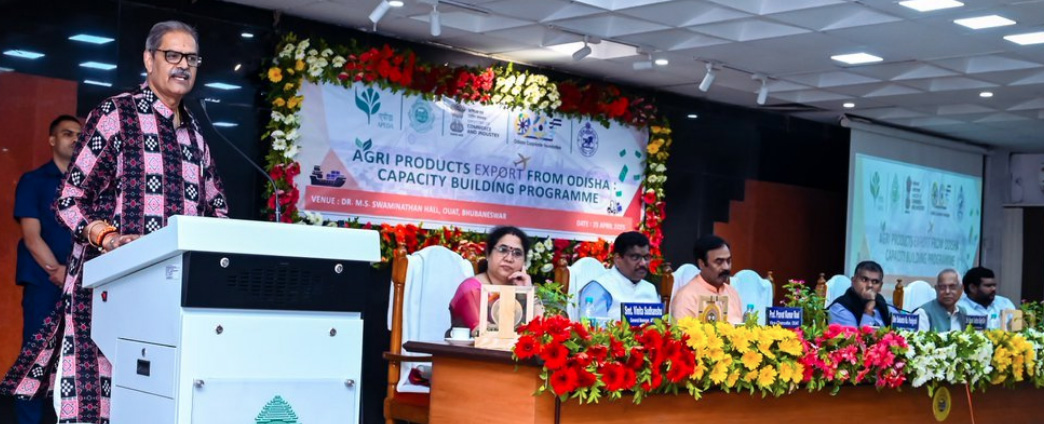Bhubaneswar: A significant step towards enhancing Odisha’s agricultural exports was taken today with a Workshop cum Capacity Building Programme organized by the Agricultural and Processed Food Products Export Development Authority (APEDA) and the Government of Odisha. Held at the Dr. M.S. Swaminathan Hall, Odisha University of Agriculture and Technology (OUAT), Bhubaneswar, the event aimed to empower local stakeholders and unlock the state’s vast potential in the global agricultural marketplace.
The workshop showcased the rich agricultural diversity of Odisha, with over 10 stalls featuring Farmer Producer Organisations (FPOs), Farmer Producer Companies (FPCs), women agripreneurs, and various departments of the state government, alongside exporters from across Odisha. A captivating array of Geographical Indication (GI) tagged and other prominent agri-products from the state were displayed, including the aromatic Koraput Kalajeera Rice, the unique Nayagad Kanteimundi Brinjal, fragrant Ganjam Kewda Flower Products, the emerging Koraput Coffee, vibrant Kandhamal Haldi Powder, the sweet Kendrapada Rasabali, the iconic Salepur Rasagolla, the traditional Khajuri Gud, the delectable Dhenkanal Magaji Ladoo, and the novel Mayurbhanja Kai Chutni.
The Chief Guest, Kanak Bardhan Singh Deo, the Deputy Chief Minister and Minister of Agriculture for the Government of Odisha, delivered a compelling keynote address. He underscored the state government’s proactive initiatives to significantly increase agricultural exports, with a particular focus on the burgeoning organic products sector. Shri Singh Deo urged exporters to actively explore the diverse range of products, including the state’s prized GI-tagged items, for robust promotion in the international arena. He also lauded the strong collaborative efforts between APEDA and the state government in their shared vision of elevating agricultural exports from Odisha.
The day’s agenda featured three insightful technical sessions designed to address critical aspects of boosting Odisha’s agricultural exports. The first session delved into the promotion of organic exports under the revised National Programme for Organic Production (NPOP), emphasizing the importance of organic certification, strategic value chain development, and effective market access strategies. The second session focused on actionable strategies to enhance rice exports from Odisha, highlighting the potential of unique local varieties, the need for improved logistics infrastructure, and effective solutions to overcome export-related challenges. The third session explored the promising opportunities for value addition and export promotion of agri-processed and GI-tagged products, with a strong emphasis on strengthening logistics, developing robust cold chain infrastructure, and establishing strong market linkages.
The program witnessed enthusiastic participation from over 400 key stakeholders, including officials from various state government departments, representatives from the Odisha University of Agriculture and Technology, and members of numerous FPOs, FPCs, and progressive farmers from across the state.
On the sidelines of the main event, APEDA, in its capacity as the Secretariat for the National Programme for Organic Production (NPOP), organized a dedicated stakeholder interaction. This session brought together over 30 organic grower groups from the state and organic certification bodies operating within Odisha. Discussions centered on the recently launched revisions in the NPOP (8th Edition), effective from January 9th, 2025. The session provided a valuable platform for clearing doubts and addressing queries from growers regarding the new provisions.
Sukanta Kumar Panigrahi, Member of Parliament and Member of the Parliamentary Standing Committee on Agriculture, Animal Husbandry and Food Processing, emphasized the significance of the One District One Product (ODOP) initiative and the strategic utilization of the Agri-Infra fund to bolster agricultural exports from Odisha. He further asserted that achieving the vision of a “Viksit Bharat” (Developed India) by 2047 hinges on developing a comprehensive agricultural export ecosystem that fosters competitive advantage, drives economic growth, creates valuable employment opportunities, and generates crucial foreign exchange earnings.
In his welcome address, Abhishek Dev, Chairman of APEDA, highlighted the organization’s export-oriented strategy for agricultural products, with a particular emphasis on the significant potential of organic products. He underscored the untapped potential of Odisha in the realm of agricultural exports, especially in the organic sector, owing to the state’s remarkable biodiversity and substantial agricultural output. Shri Dev assured attendees that APEDA would continue to organize such crucial programs and export conclaves in the future to further stimulate agricultural exports from the region. He strongly encouraged FPOs and FPCs from the state to actively participate in key national and international trade fairs to gain vital market access, enhance promotion efforts, and expand their outreach.
The Workshop cum Capacity Building Programme, followed by the focused Technical Sessions, effectively convened key policymakers and experts from both the Union and State governments, as well as representatives from industry and academia. The collective aim of this collaborative effort is to cultivate a resilient and thriving export ecosystem within the state in the years to come, paving the way for Odisha to emerge as a significant player in the global agricultural trade landscape.


